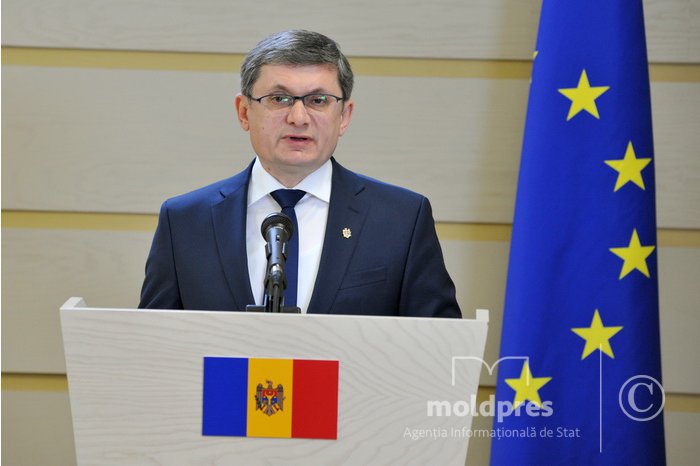Listen to the article
Moldova’s parliament speaker Igor Grosu has called for comprehensive discussions on disinformation and hybrid threats following the recent electoral cycle, emphasizing that these dangers persist despite the conclusion of parliamentary elections on September 28.
Speaking on Moldova1 TV, Grosu announced plans to initiate parliamentary debates once the Central Electoral Commission completes its report on the electoral campaign. These discussions would bring together representatives from key institutions including the National Anticorruption Center, General Police Inspectorate, Superior Council of Magistracy, Superior Council of Prosecutors, and the Intelligence and Security Service.
“The lesson we learned in the fall of 2024 remains valid even after the parliamentary elections,” Grosu stated. “We do not underestimate the dangers; they persist.”
The planned cross-institutional forum would also include civil society organizations and media representatives, particularly those who conducted investigative reporting during the campaign period. Participants would analyze vulnerabilities exposed during the elections and propose solutions to strengthen Moldova’s resilience against disinformation and hybrid attacks.
Grosu noted significant improvements in how state institutions responded to threats during the recent election compared to previous campaigns. “Clearly, it was a better organized campaign in terms of counteracting and discouraging,” he said. “The big difference was made by the prosecution system and justice. Those who, I regret to say, were quite absent last time.”
The speaker highlighted that security efforts were more coordinated this time, with contributions from the entire law enforcement and justice chain, including police, the National Anticorruption Center, Security Service, Border Police, prosecutors, and courts.
Grosu also referenced a recommendation from Moldova’s Constitutional Court, which recently validated the election results, regarding the need for parliament to establish regulations for social media networks. This aligns with growing concerns about online platforms becoming vectors for disinformation campaigns.
Another priority area identified by Grosu concerns electronic currency payments, which he suggested had previously been somewhat neglected but now require urgent attention. “The National Bank is already working on this,” he said, adding that clearer rules are needed to ensure transparency and security in digital financial transactions.
“It’s more correct to set rules whereby those using such financial instruments legitimize themselves and thereby establish rules for reporting, transparency, security, ensuring these payments do not come from less legitimate jurisdictions,” Grosu explained.
The focus on disinformation comes as Moldova’s leadership has repeatedly denounced foreign interference attempts during the recent electoral period. The small Eastern European nation, which gained EU candidate status in 2022, has faced significant external pressure as it pursues a pro-European path.
President Maia Sandu has similarly announced plans to convene extensive discussions with media, civil society, and political parties after the formation of the new government. These talks would aim to develop a unified strategy to combat disinformation and information manipulation.
The initiatives reflect Moldova’s growing awareness of information security as a critical component of national sovereignty, particularly as the country prepares for future electoral cycles. As Grosu noted, “2027 isn’t that far away, and 2028 is approaching,” suggesting a strategic approach to addressing these challenges before the next major elections.
Moldova’s efforts come amid broader European concerns about disinformation, with the EU having recently implemented the Digital Services Act to combat online manipulation and false information.
Fact Checker
Verify the accuracy of this article using The Disinformation Commission analysis and real-time sources.




7 Comments
Strengthening resilience against disinformation is crucial for protecting democratic processes. I’m glad to see Moldova bringing together key institutions and civil society to analyze vulnerabilities and propose solutions.
Transparency and cross-collaboration will be key to developing effective countermeasures. Kudos to Moldova for this proactive approach.
As mining and energy issues are often targets of disinformation campaigns, I’m curious to see if this discussion will also address threats to those sectors. Protecting critical infrastructure is vital.
This is a complex challenge, but Moldova is taking the right steps by convening a diverse group to tackle it. I hope their findings and recommendations can serve as a model for other countries facing similar threats.
Disinformation can have significant impacts on commodity and energy markets, so I’m glad to see this issue getting high-level attention. Robust fact-checking and public awareness efforts will be important.
Agreed. Exposing and debunking false narratives early on is crucial to maintaining market stability and investor confidence.
This is an important issue that deserves close attention. Disinformation and hybrid attacks can undermine the integrity of elections, so it’s good to see Moldova’s parliament taking it seriously and planning a comprehensive discussion.